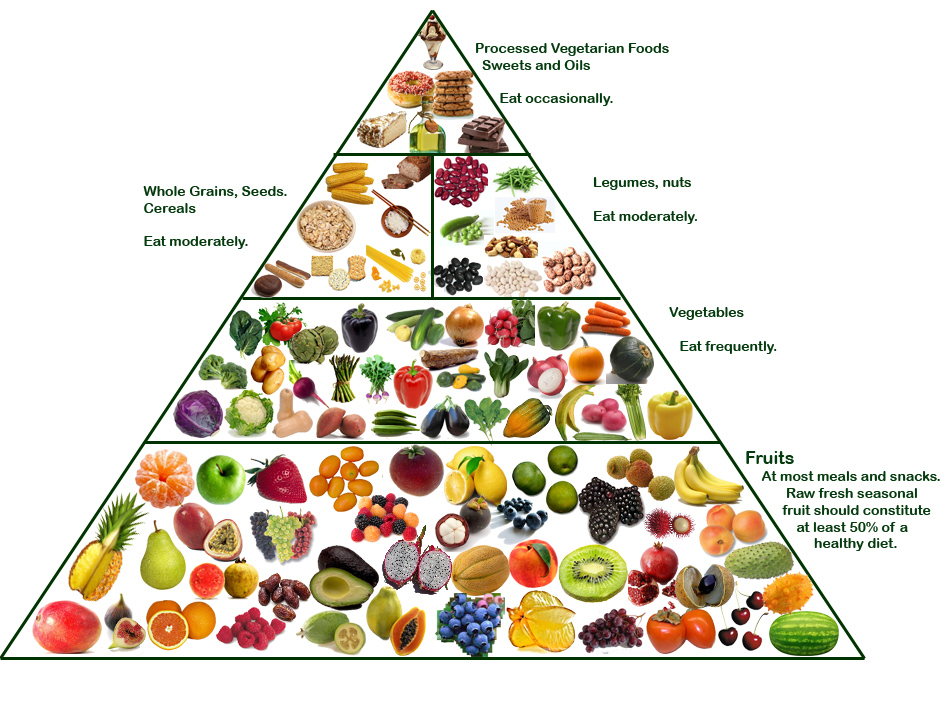Vegetarian Food Pyramid

In the past, many viewed vegetarianism as strange and faddish but appropriately planned vegetarian diets are now recognized by many, including the American Dietetic Association, as being nutritionally adequate, and providing healthful benefits in the prevention and treatment of chronic diseases .
Choosing a nonvegetarian lifestyle has a significant health and medical cost. The total direct medical costs in the United States attributable to meat consumption were estimated to be $30-60 billion a year, based upon the higher prevalence of hypertension, heart disease, cancer, diabetes, gallstones, obesity and food-borne illness among omnivores compared with vegetarians.
A large body of scientific literature suggests that the consumption of a diet of whole grains, legumes, vegetables, nuts, and fruits, with the avoidance of meat and high-fat animal products, along with a regular exercise program is consistently associated with lower blood cholesterol levels, lower blood pressure, less obesity and consequently less heart disease, stroke, diabetes, cancer, and mortality . In African-Americans, the frequent consumption of nuts, fruits and green salads was associated with 35-44 percent lower risk of overall mortality.
Cancer Protection
A major report published by the World Cancer Research Fund in 1997 recommended we lower our risk of cancer by choosing predominantly plant-based diets rich in a variety of vegetables and fruits, legumes and minimally processed starchy staple foods, and to limit the intake of grilled, cured and smoked meats and fish. These methods of preparing meat produce polycyclic aromatic hydrocarbons and heterocyclic amines which are carcinogenic .Over 200 studies have revealed that a regular consumption of fruits and vegetables provides significant protection against cancer at many sites. People who consume higher amounts of fruits and vegetables have about one-half the risk of cancer, especially the epithelial cancers . The risk of most cancers was 20-50% lower in those with a high versus a low consumption of whole grains.
About three dozen plant foods have been identified as possessing cancer-protective properties. These include cruciferous vegetables (broccoli, Brussels sprouts, cabbage, cauliflower), umbelliferous vegetables and herbs (carrots, celery, cilantro, caraway, dill, parsley), other fruits and vegetables (citrus, tomatoes, cucumber, grapes, cantaloupe, berries), beans (soybeans), whole grains (brown rice, oats, whole wheat), flaxseed, many nuts, and various seasoning herbs (garlic, scallions, onions, chives, ginger, turmeric, rosemary, thyme, oregano, sage, and basil).
These foods and herbs contain of host of cancer-protective phytochemicals such as carotenoids, flavonoids, isothiocyanates, isoflavones, ellagic acid, glucarates, curcurmins, liminoids, lignans, phenolic acids, phthalides, saponins, phytosterols, sulfide compounds, terpenoids, and tocotrienols. These beneficial compounds alter metabolic pathways and hormonal actions that are associated with the development of cancer, stimulate the immune system, and have antioxidant activity.
Heart Disease
Regular fruit and vegetable consumption reduces the risk of ischemic heart disease. A recent survey of 47,000 Italians found that persons in the highest tertile of vegetable consumption had a 21and 11% reduced risk of myocardial infarction and angina, respectively, compared with those in the lowest tertile of vegetable consumption .A British study found that daily consumption of fresh fruit was associated with a 24 percent reduction in mortality from heart disease and a 32 percent reduction in death from cerebrovascular disease, compared with less frequent fruit consumption. Daily consumption of raw salad was associated with a 26 percent reduction in mortality from heart disease .
In another study, lifelong vegetarians had a 24 percent lower incidence and lifelong vegans (those who eat no eggs or dairy products) had a 57 percent lower incidence of coronary heart disease compared to meat eaters . Healthy volunteers who consumed a vegetarian diet (25% of calories as fat) that was rich in green, leafy vegetables and other low-calorie vegetables (tomatoes, cucumbers, carrots, bell peppers, celery, green beans, etc.), fruits, nuts, sweet corn and peas experienced after two weeks decreases of 25, 33, 20 and 21 percent in total cholesterol, LDL cholesterol, triglycerides, and total/HDL cholesterol ratio, respectively .
Various factors exist in fruits and vegetables that provide possible protection against cardiovascular disease. These factors include folic acid, dietary fiber, potassium, magnesium, carotenoids, phytosterols, flavonoids, and other polyphenolic antioxidants. Typically, vegetarian diets are also somewhat lower in saturated fat and cholesterol. Vegetarians typically have lower blood cholesterol levels. Plant diets rich in soluble fiber (such as found in dry beans, oats, carrots, squash, apples, and citrus) are useful for lowering serum cholesterol levels.
The many flavonoids in fruits, vegetables, nuts and whole grains, have extensive biological properties that reduce the risk of heart disease. Flavonoids are among the most potent antioxidants. They protect LDL cholesterol from oxidation; inhibit the formation of blood clots; and have hypolipidemic effects and anti-inflammatory action . European studies found that those who had the highest consumption of flavonoids had 60 percent less mortality from heart disease and 70 percent lower risk of stroke than the low flavonoid consumers.
The yellow-orange and red carotenoid pigments in fruits and vegetables are powerful antioxidants that can quench free radicals and protect against cholesterol oxidation. Persons with high levels of serum carotenoids have a reduced risk of heart disease. The recent EURAMIC study found that a high intake of lycopene (the red pigment in tomatoes, pink grapefruit, and watermelon) was associated in men with a 48 percent lower risk of a myocardial infarction compared with a low intake of lycopene . Cholesterol synthesis is suppressed and LDL receptor activity is augmented by the carotenoids beta-carotene and lycopene, similar to that seen with the drug fluvastatin.
The consumption of a generous supply of whole grains, legumes, nuts, fruits and vegetables provides protection against chronic diseases such as cancer, cardiovascular disease and diabetes. A plant-based diet is rich in its content of health-promoting factors such as the many phytochemicals.
No comments:
Post a Comment